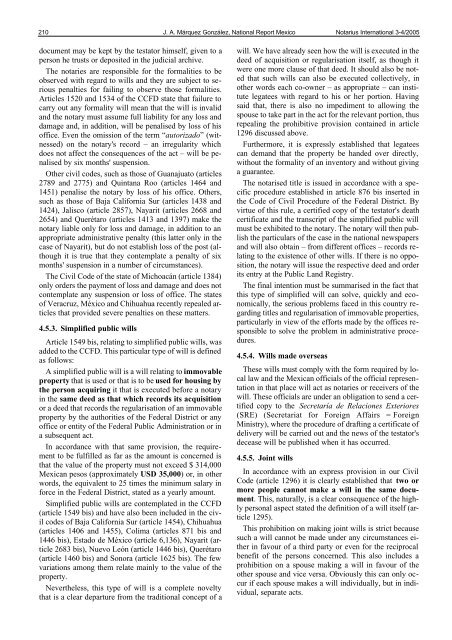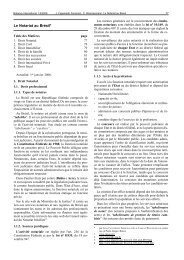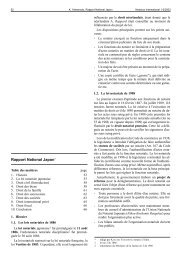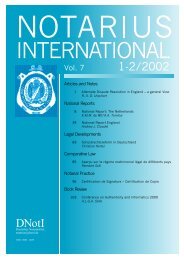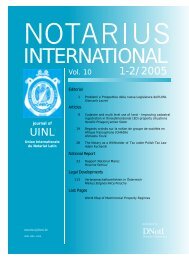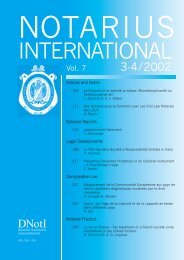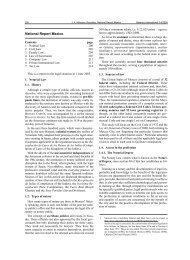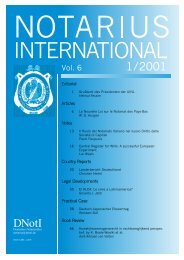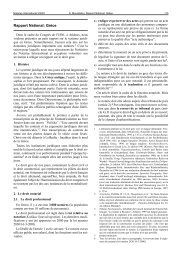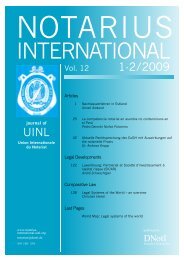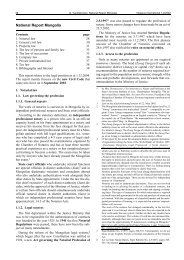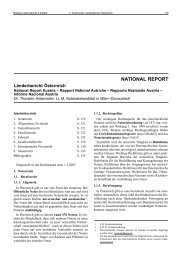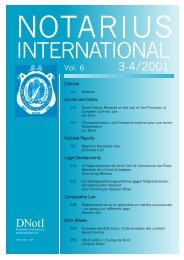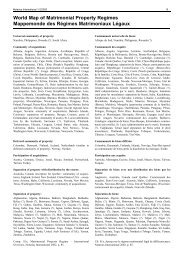Create successful ePaper yourself
Turn your PDF publications into a flip-book with our unique Google optimized e-Paper software.
210 J. A. Márquez González, National Report Mexico <strong>Notarius</strong> <strong>International</strong> 3-4/<strong>2005</strong><br />
document may be kept by the testator himself, given to a<br />
person he trusts or deposited in the judicial archive.<br />
The notaries are responsible for the formalities to be<br />
observed with regard to wills and they are subject to serious<br />
penalties for failing to observe those formalities.<br />
Articles 1520 and 1534 of the CCFD state that failure to<br />
carry out any formality will mean that the will is invalid<br />
and the notary must assume full liability for any loss and<br />
damage and, in addition, will be penalised by loss of his<br />
office. Even the omission of the term “autorizado” (witnessed)<br />
on the notary's record – an irregularity which<br />
does not affect the consequences of the act – will be penalised<br />
by six months' suspension.<br />
Other civil codes, such as those of Guanajuato (articles<br />
2789 and 2775) and Quintana Roo (articles 1464 and<br />
1451) penalise the notary by loss of his office. Others,<br />
such as those of Baja California Sur (articles 1438 and<br />
1424), Jalisco (article 2857), Nayarit (articles 2668 and<br />
2654) and Querétaro (articles 1413 and 1397) make the<br />
notary liable only for loss and damage, in addition to an<br />
appropriate administrative penalty (this latter only in the<br />
case of Nayarit), but do not establish loss of the post (although<br />
it is true that they contemplate a penalty of six<br />
months' suspension in a number of circumstances).<br />
The Civil Code of the state of Michoacán (article 1384)<br />
only orders the payment of loss and damage and does not<br />
contemplate any suspension or loss of office. The states<br />
of Veracruz, México and Chihuahua recently repealed articles<br />
that provided severe penalties on these matters.<br />
4.5.3. Simplified public wills<br />
Article 1549 bis, relating to simplified public wills, was<br />
added to the CCFD. This particular type of will is defined<br />
as follows:<br />
A simplified public will is a will relating to immovable<br />
property that is used or that is to be used for housing by<br />
the person acquiring it that is executed before a notary<br />
in the same deed as that which records its acquisition<br />
or a deed that records the regularisation of an immovable<br />
property by the authorities of the Federal District or any<br />
office or entity of the Federal Public Administration or in<br />
a subsequent act.<br />
In accordance with that same provision, the requirement<br />
to be fulfilled as far as the amount is concerned is<br />
that the value of the property must not exceed $ 314,000<br />
Mexican pesos (approximately USD 35,000) or, in other<br />
words, the equivalent to 25 times the minimum salary in<br />
force in the Federal District, stated as a yearly amount.<br />
Simplified public wills are contemplated in the CCFD<br />
(article 1549 bis) and have also been included in the civil<br />
codes of Baja California Sur (article 1454), Chihuahua<br />
(articles 1406 and 1455), Colima (articles 871 bis and<br />
1446 bis), Estado de México (article 6,136), Nayarit (article<br />
2683 bis), Nuevo León (article 1446 bis), Querétaro<br />
(article 1460 bis) and Sonora (article 1625 bis). The few<br />
variations among them relate mainly to the value of the<br />
property.<br />
Nevertheless, this type of will is a complete novelty<br />
that is a clear departure from the traditional concept of a<br />
will. We have already seen how the will is executed in the<br />
deed of acquisition or regularisation itself, as though it<br />
were one more clause of that deed. It should also be noted<br />
that such wills can also be executed collectively, in<br />
other words each co-owner – as appropriate – can institute<br />
legatees with regard to his or her portion. Having<br />
said that, there is also no impediment to allowing the<br />
spouse to take part in the act for the relevant portion, thus<br />
repealing the prohibitive provision contained in article<br />
1296 discussed above.<br />
Furthermore, it is expressly established that legatees<br />
can demand that the property be handed over directly,<br />
without the formality of an inventory and without giving<br />
a guarantee.<br />
The notarised title is issued in accordance with a specific<br />
procedure established in article 876 bis inserted in<br />
the Code of Civil Procedure of the Federal District. By<br />
virtue of this rule, a certified copy of the testator's death<br />
certificate and the transcript of the simplified public will<br />
must be exhibited to the notary. The notary will then publish<br />
the particulars of the case in the national newspapers<br />
and will also obtain – from different offices – records relating<br />
to the existence of other wills. If there is no opposition,<br />
the notary will issue the respective deed and order<br />
its entry at the Public Land Registry.<br />
The final intention must be summarised in the fact that<br />
this type of simplified will can solve, quickly and economically,<br />
the serious problems faced in this country regarding<br />
titles and regularisation of immovable properties,<br />
particularly in view of the efforts made by the offices responsible<br />
to solve the problem in administrative procedures.<br />
4.5.4. Wills made overseas<br />
These wills must comply with the form required by local<br />
law and the Mexican officials of the official representation<br />
in that place will act as notaries or receivers of the<br />
will. These officials are under an obligation to send a certified<br />
copy to the Secretaría de Relaciones Exteriores<br />
(SRE) (Secretariat for Foreign Affairs = Foreign<br />
Ministry), where the procedure of drafting a certificate of<br />
delivery will be carried out and the news of the testator's<br />
decease will be published when it has occurred.<br />
4.5.5. Joint wills<br />
In accordance with an express provision in our Civil<br />
Code (article 1296) it is clearly established that two or<br />
more people cannot make a will in the same document.<br />
This, naturally, is a clear consequence of the highly<br />
personal aspect stated the definition of a will itself (article<br />
1295).<br />
This prohibition on making joint wills is strict because<br />
such a will cannot be made under any circumstances either<br />
in favour of a third party or even for the reciprocal<br />
benefit of the persons concerned. This also includes a<br />
prohibition on a spouse making a will in favour of the<br />
other spouse and vice versa. Obviously this can only occur<br />
if each spouse makes a will individually, but in individual,<br />
separate acts.


